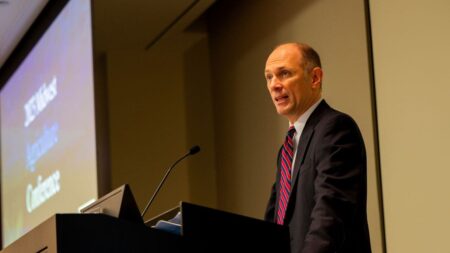Between mass layoffs and the new demand for top talent in fields like artificial intelligence, many Americans are having “new job” interviews for the first time in a long time.
There is no shortage of interview advice out there – from academia to recruiting firms. Common tropes like “dress for success” and “show up on time” are a dime a dozen and not particularly insightful. And, with AI-driven screening systems all the rage in 2024, job-seekers are loading up their resumes with buzzwords to showcase their skills (real or not).
Awhile back, I wrote a book with the help of the senior partners at one of the country’s top five executive recruiting firms. For the book, I interviewed nearly 40 partners, asking about the make-or-break factors in “final round” interviews. Their advice is just as true today.
The truth is that, from the beginning, much of the candidate screening process is designed to eliminate candidates who won’t ever make it to the finals. Responses to job postings are designed to figure out who to drop from consideration.
CAN’T GET AN INTERVIEW? CAREER EXPERTS EXPLAIN HOW TO MAKE YOUR RESUME STAND OUT FROM THE CROWD
Once you are identified as a serious candidate, you advance to half-days or full days of interviews with more senior interviewers. The employer has already concluded that you can do the job exceptionally well, but so can others – the focus is on the best fit for the firm.
So you haven’t crossed the finish line yet. Unique deadly sins exist at this end stage of the interview process, particularly when it comes to maturity, ethics and a deeper understanding of the company’s needs. Don’t make it easy to be eliminated!

Based on my research and experience interviewing many hundreds of people over the years, here are the top five sins to avoid:
Playing hard to get as a negotiation ploy. Acting disinterested, or starting too early on the salary negotiation process, does not convey that you’re a team player who wants to fit into a larger corporate culture. The employer wants to see that you would be (1) enthusiastic about the job and (2) enjoyable to be around.
VIRAL WORK TREND FAVORS ‘THE BIG TALK’ DURING JOB INTERVIEWS OVER SMALL TALK: ‘VULNERABILITY IS DISARMING’
Intentional aloofness does not clear those hurdles, and you need to clear them for the employer to even start thinking about potential compensation. If your early questions focus on pay and benefits, rather than mission and strategy, it shouts, “They’re not in it for the right reasons.”

Doing no homework on the company. Research your potential employer beforehand, and don’t fake it.
Job-seekers need to be able to discuss the positive reasons why they are genuinely eager about their prospects and the job at hand. This means asking intelligent questions about the company’s products and competitors too, because there is more to “the job” than the job itself. You come across as unserious and unprepared if you ask, “What can you tell me about the company?”
Hiding holes in your resume. Many people have had periods of unemployment or taken jobs for short periods – this is common.
While the temptation to “stretch” beginning and ending dates of jobs from before is understandable, employers can easily confirm that information. And, if you’re a top candidate, it will be confirmed at some point, so it is in your best interest to be honest. Nothing ends a candidacy faster than being asked what you were “really doing” during certain dates that your resume suggests were spent working elsewhere. You won’t get away with lying.
TOUGHEST JOB INTERVIEW QUESTION OF ALL: ‘WHAT CAN YOU IMPROVE ABOUT YOURSELF?’
Bad-mouthing your current employer or betraying a confidence. This is a rookie mistake: Trying to show your enthusiasm for the new job by implying that you’re eager to be getting away from the problems somewhere else. Don’t ever put yourself in a position where you are throwing someone else under the bus, since it just says the wrong thing about you.
Here’s the only appropriate answer to the “why would you leave XYZ” question: “Actually, XYZ has been really good to me, but I have the potential to contribute more and ABC seems like the right place to do so.”
Forgetting that each separate interview starts from zero. If you’re a finalist, you may encounter four or five people in a single day – from entry-level staffers to peers and more senior-level employees. Just because someone’s position may fall “beneath” yours, you still need to give everyone the same time of day.
Word spreads, and even junior employees could share their feelings about a certain candidate – everyone has a vote. Never even hint that you were asked the same question by someone else earlier; answer fully, even if it’s the second or third time.
When you have made it through to the final round of the interview process, think about which questions may tempt you down one of these deadly paths. Then, practice responding to avoid them – and stay alive.
Read the full article here










